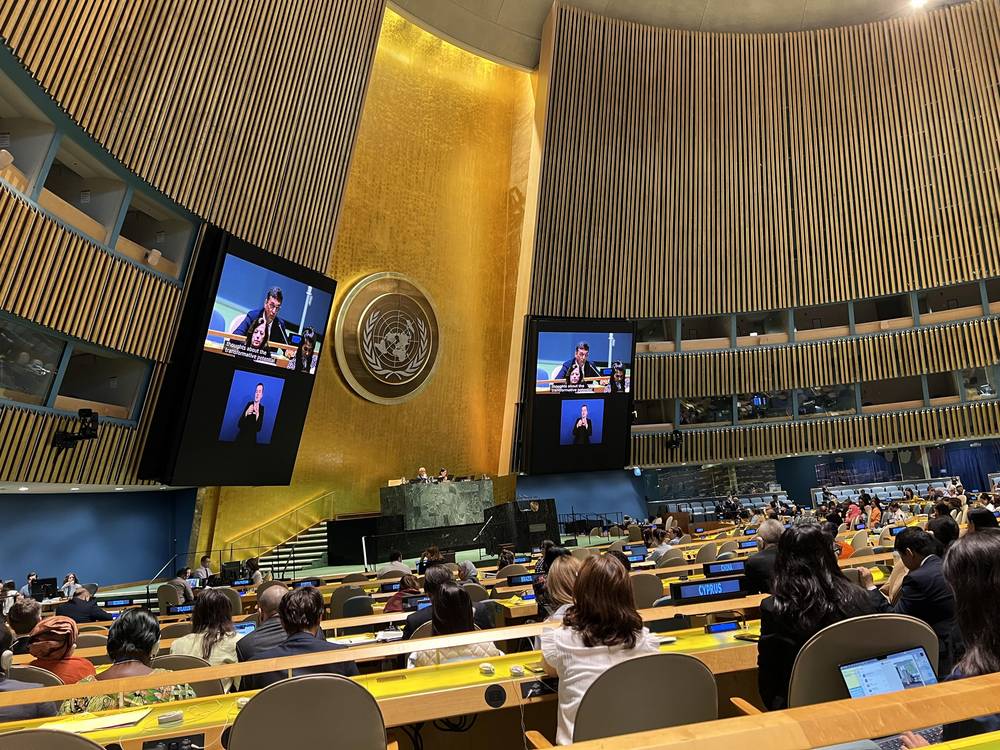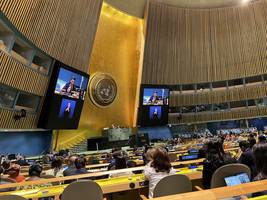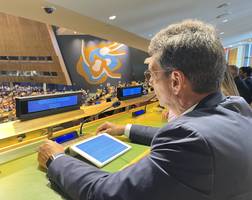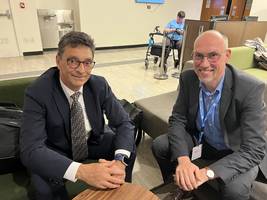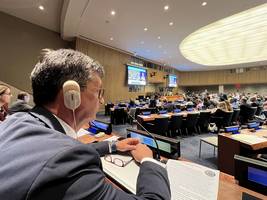Human Rights Ombudsman Peter Svetina is participating in the 17th session of the Conference of States Parties to the Convention of the United Nations (UN) on the Rights of Persons with Disabilities (COSP17 - CRPD), which will be held in New York from 11 to 13 June. Ahead of the Summit of the Future, which will be held within the framework of the UN at the level of world leaders in September 2024, the common thread of the session is a rethinking of the importance of including disabled people and the search for an international consensus on how to provide them with a better present and protect their future. Acceptance of fellow human beings regardless of their personal circumstances is a reflection of maturity, believes Svetina, who emphasises that countries must take a more active stance in caring for the disabled and show greater ambition not only at the national, but also at the international level. "All too many meetings pass in patting on the back and satisfaction that we remembered them. But we will actually show respect and development when every disabled person is enabled to be heard, seen and understood, regardless of disability. Co-creating progress is everyone's responsibility, regardless of the individual's psychophysical abilities, and we will have to take many decisive joint steps in this area to ensure the equal inclusion of disabled people in society," Svetina emphasises.
At the meeting, he actively participated in the general discussion. As one of the sub-themes of the conference was international cooperation to promote technological innovation and technology transfer for an inclusive future, he focused in his address on the advantages, challenges, and risks of artificial intelligence on the rights of people with disabilities. Svetina also spoke on behalf of the Working Group on the Rights of Persons with Disabilities of the European Network of National Human Rights Institutions (ENNHRI), which brings together more than 40 European Human Rights institutions on how countries can work together towards a future in which artificial intelligence not only accelerates technological progress, but also preserves and strengthens fundamental rights. He assessed that it is essential that the technological development of artificial intelligence takes place within appropriate legal and ethical frameworks, which will strengthen the existing levels of respect for human rights and fundamental freedoms of each individual. “I firmly believe that an inclusive future in which people with disabilities can fully enjoy their rights under the Convention on the Rights of Persons with Disabilities is within reach. This requires strong political will and determination to invest in promoting accessibility and supporting independent living in the community," Svetina asserted in his speech. As he said, artificial intelligence offers many innovative solutions and new possibilities for communication, interaction, independence, and inclusion of disabled people. “Speech-to-text or vision-enhancement tools remove many barriers. By using voice recognition functions or gesture control, digital platforms are more user-friendly. Navigation systems powered by artificial intelligence help people with visual or mobility impairments navigate public spaces. Adaptive learning platforms are a tremendous added value for students with learning disabilities, and in the workplace, AI also provides disabled people with tools that adapt to different abilities, opening up equal employment opportunities. Artificial intelligence also brings solutions and improvements in the field of healthcare and pharmacy, but in all industries, it also raises important questions and brings risks – including for the disabled," he stated.
As he said, artificial intelligence, which is used in decision-making systems about individual rights and obligations, affects many human rights, for example, privacy and protection of personal data, the principle of equality and social justice, freedom of expression and assembly, the right to non-discriminatory treatment, and the right to work, as well as individual autonomy and dignity. Thus, according to the Slovenian Ombudsman, systems powered by artificial intelligence can, for example, by using biased or discriminatory algorithms, unduly limit eligibility for benefits such as unemployment benefits. “If AI systems are trained on flawed data sets, they can also be biased in hiring. They can also provide incorrect risk assessments based on disability types, which can result in unfair increases in health insurance premiums, and I could go on and on,” he said.
Svetina underlined the importance of ENNHRI's activities and the joint efforts of its members, including Slovenia, to promote human rights in the field of artificial intelligence at the European level. He said this organisation had made a significant contribution to the adoption of the Act of the European Union on artificial intelligence and the Framework Convention of the Council of Europe on artificial intelligence, human rights, democracy and the rule of law and called on countries to ensure that national human rights institutions have sufficient capacity to efficient performance of their duties. "Strong national institutions for human rights and independent monitoring bodies, together with disability organisations, are essential for promoting, protecting and monitoring the implementation of the Convention on the Rights of Persons with Disabilities," Peter Svetina also believes.
In the conversations he conducted, Svetina underlined the importance of effective international cooperation, with the help of which countries can create connected and effective solutions from a multitude of different initiatives. In his opinion, the flow of information between policymakers and the community that develops and uses artificial intelligence is also extremely important. "When formulating policies and developing and using artificial intelligence systems in the case of vulnerable groups, active consultation with them or their representative organisations is key," he said, and also pointed out the responsibility of more developed countries to help developing countries in the field of artificial intelligence, as the technological vacuum is being entered by countries and private companies for whom respect for human rights in the development of artificial intelligence is not a high priority. As he said, human rights must always be put before private business interests.
On the margins of the session, the Ombudsman also met with Ambassador Boštjan Malovrh, Permanent Representative of the Republic of Slovenia to the United Nations in New York, and thanked him and his team, with whom he also met, for all Slovenia's efforts in enforcing human rights at the international level, particularly within the framework of the Third Committee of the United Nations General Assembly (Third Committee), ECOSOC, the Human Rights Council and treaty bodies. At the meeting with Ambassador Samuel Žbogar, Ombudsman Svetina specifically highlighted his expectation that Slovenia, within the framework of its activities in the Security Council, advocates for international peace and security in a way that, in addition to the political and military aspects, also includes humanitarian, health, environmental, technological and other dimensions.
